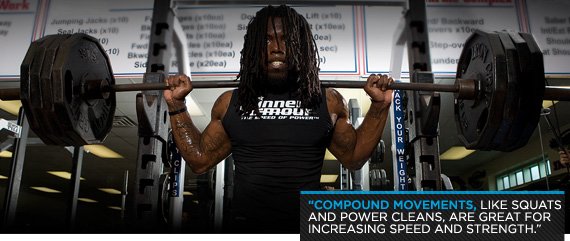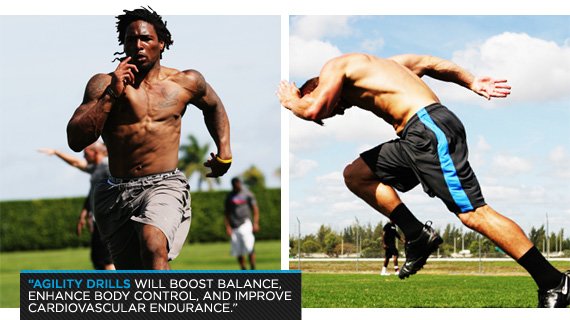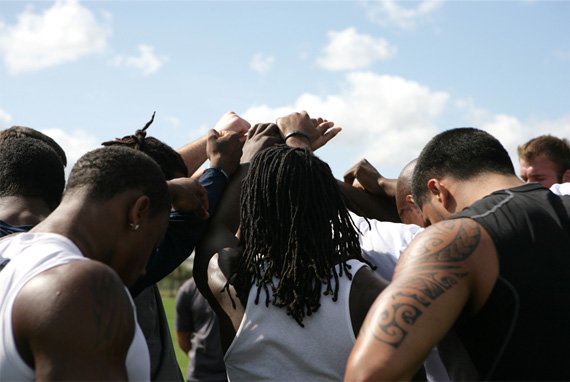OK, so maybe you're not an Olympic athlete. Maybe your dreams of playing in the NBA died when you realized 5-foot-8 is the tallest you'll ever be. (No offense to Nate Robinson, of course.) Heck, let's say your athletic endeavors only go as far as Sunday afternoon city-league soccer games. The truth is, no matter how much or how little you participate in sports, you should be concerned with your performance.
Your workout should do more than just help you burn fat or build muscle—it should help increase your balance, strengthen your functional movements, and make you a more athletic person. Athleticism is just as important in the gym as outside it.
Take the necessary steps to maximize your performance in the weight room, on the court, or in the pool. Too many people go through the motions without considering how much better they could be doing. The result: Substandard training leads to mediocre results.
Use these training tips to ensure that you get the most out of your workouts. The better you train, the more successful you'll be in your athletic efforts. Don't train for show. You need show and go. You'll look better, feel better, and kick significantly more butt.
1 /// Change Your Lifting Strategy
Unless you are a bodybuilder, physique athlete, or just into sculpting your body, you won't have to worry about how big your biceps are. If you're training for athletics, you can leave hypertrophy behind and focus on building strength.
As an athlete, your goal is to increase your strength and your ability to accelerate. Compound movements, like squats and power cleans, are great for increasing speed and strength. You also need to lift heavy weight. Couple heavy lifts with lightly-loaded speed lifts for maximum benefit.

2 /// Focus On Explosion
Forget about time under tension and extremely slow, torturous reps. Drop the slow stuff and start moving weight as explosively as possible. Keep the bar under control, but don't hesitate to move through the concentric portion of a lift with everything you've got.
The best movements for athletes may not even have an eccentric portion. Too much time on the downward portion of a lift can make an athlete unnecessarily sore and detract from his or her performance on the field. How do you think Reggie Bush's coaches would like it if he showed up to a game with sore legs?
3 /// Take Your Cardio Outdoors
Spending half an hour locked into a fixed plane of motion on the elliptical isn't really functional for an athlete. Take your cardio outside. Outdoor cardio workouts like hill sprints, rollerblading, or mountain biking will more closely mimic the movement patterns you'll do during your sport.
Better yet, try doing agility drills in an open field. You'll boost your balance, control, and improve your cardiovascular endurance at the same time.

4 /// Take Cat Naps
The best thing for recovery is sleep. For maximizing your body's ability to rebuild muscle tissue, nothing comes close to eight solid hours of sleep. If you're having a tough time logging those hours, squeeze in some cat naps. Twenty or 30 minutes of sleep after a workout can go a long way toward boosting your recovery.
5 /// Supplement With Glutamine
Glutamine is an excellent supplement for optimizing recovery, especially for athletes who train frequently with extreme effort. Use it after a workout to restock your body's stores and help keep your immune system going strong.
6 /// Get Plenty Of Calcium



Most people think of calcium as the bone-building nutrient. What they don't know is that it's also imperative for achieving proper muscular contractions. As a result, if you're not taking in enough calcium, your athletic performance can fall short.
Be sure to regularly eat foods such as low-fat cottage cheese, Greek yogurt, and skim milk. If you're lactose intolerant, consider taking a calcium supplement.
7 /// Fuel Your Training
Athletes need to perform at their peak, inside and outside the gym. If you're training for performance, an extremely low-carb diet isn't the best plan. Any form of intense training demands glucose as a fuel source, so you need to fuel your workouts with carbs.
This doesn't mean you need to adopt a high-carb diet. But, make sure you get something like 40 grams of carbs before you hit the field. This will help you quell fatigue and maintain energy. To help your body recover, consume carbs post-workout as well.
8 /// Hydrate, Hydrate, Hydrate
Even slight dehydration can negatively influence your performance. It's not something to take lightly. You need to hydrate before, during, and after your training. Like we learned in elementary school: Your body, like the planet, is mostly water, so drink up!

9 /// Take Rest Days
On your rest days, rest. Don't do an active recovery cardio session or go for an hour-long brisk walk for "leisure." Make a solid commitment to rest your central nervous system. You'll feel better going into your next training session.
10 /// Periodize Your Training
The most popular form of period training is conjugate training. Say what? Conjugate training means you're improving multiple fitness qualities at the same time. So, even if you put 50-70 percent of your work on max effort, you never completely ignore speed or agility.
In more simple terms, don't just go into the gym and lift willy-nilly. You need a specific methodology that will help you reach your goals. If you're serious about boosting your performance power, consider working with a certified strength and conditioning specialist or other qualified trainer. He or she will be able to develop the right plan for your needs.





